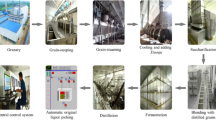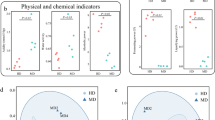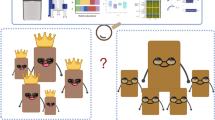Abstract
The maturation period of high-temperature Daqu (HTD) is usually 3–6 months, and the characteristics of HTD at different maturation stages were different. In this study, the microbial characteristics and metabolite profiles of HTD at different maturation stages were revealed with the combination of physicochemical detection, the third generation Pacific Biosciences (PacBio) single-molecule, real-time (SMRT) sequencing technology, gas chromatography-mass spectrometry (GC-MS), and gas chromatography-ion mobility spectrometry (GC-IMS). Results showed that HTD matured for 6 months (Mix_m6) had higher saccharification power but less culturable thermotolerant bacteria and fungi than HTD matured for 3 months (Mix_m3). The average relative abundances of Thermoactinomyces, Paenibacillus, and Rasamsonia in Mix_m3 were higher than that in Mix_m6, while the average relative abundances of Bacillus, Pseudomonas, Thermoascus increased obviously with the prolongation of the maturation period. Streptomyces and Thermoactinomyces were biomarkers in Mix_m3, while Burkholderia and Pseudomonas were regarded as biomarkers in Mix_m6. Differences in microbiota structure led to different enrichment of metabolic pathways in HTD at different maturation stages, resulting in different flavor profiles, especially in ethyl acetate, 1-octen-3-one, (E)-3-Hexen-1, 2,3,5-trimethy-6-ethylpyrazine, pyrazine, tetramethyl content. The microbiota and metabolite characteristics of HTD comprehensively reflected the HTD quality in different maturation stages, which provided a reference for determining the optimal maturation time.






Similar content being viewed by others
Data availability
The datasets generated during and/or analyzed during the current study are available from the corresponding author on reasonable request.
References
Ai J, Wu QX, Battino M et al (2021) Using untargeted metabolomics to profile the changes in roselle (Hibiscus sabdariffa L.) anthocyanins during wine fermentation. Food Chem 364:130425
Cai WC, Wang YR, Liu ZJ et al (2022a) Depth-depended quality comparison of light-flavor fermented grains from two fermentation rounds. Food Res Int 159:111587. https://doi.org/10.1016/j.foodres.2022.111587
Cai WC, Xue YA, Tang FX et al (2022b) The depth-depended fungal diversity and non-depth-depended aroma profiles of pit mud for strong-flavor Baijiu. Front Microbiol 12:789845. https://doi.org/10.3389/fmicb.2021.789845
Carrión VJ, Perez-Jaramillo J, Cordovez V et al (2019) Pathogen-induced activation of disease-suppressive functions in the endophytic root microbiome. Science 366:606–612
Deng L, Mao X, Liu D et al (2020) Comparative analysis of physicochemical properties and microbial composition in high-temperature Daqu with different colors. Front Microbiol 11:588117
Du H, Wang XS, Zhang YH, Xu Y (2019) Exploring the impacts of raw materials and environments on the microbiota in Chinese Daqu starter. Int J Food Microbiol 297:32–40. https://doi.org/10.1016/j.ijfoodmicro.2019.02.020
Fan GS, Fu ZL, Sun BG et al (2019) Roles of aging in the production of light-flavored Daqu. J Biosci Bioeng 127:309–317. https://doi.org/10.1016/j.jbiosc.2018.08.005
Fan GS, Fu ZL, Teng C et al (2020) Effects of aging on the quality of roasted sesame-like flavor Daqu. BMC Microbiol 20:67. https://doi.org/10.1186/s12866-020-01745-3
Guan TW, Yang H, Ou MY, Zhang JX (2021) Storage period affecting dynamic succession of microbiota and quality changes of strong-flavor Baijiu Daqu. LWT 139:110544. https://doi.org/10.1016/j.lwt.2020.110544
He GQ, Huang J, Zhou R et al (2019) Effect of fortified Daqu on the microbial community and flavor in Chinese strong-flavor liquor brewing process. Front Microbiol 10:56. https://doi.org/10.3389/fmicb.2019.00056
Hu YL, Dun YH, Li SA et al (2017) Changes in microbial community during fermentation of high-temperature Daqu used in the production of Chinese ‘Baiyunbian’ liquor. J Inst Brew 123:594–599
Hua M, Fan ML, Li ZM et al (2021) Ginseng soluble dietary fiber can regulate the intestinal flora structure, promote colon health, affect appetite and glucolipid metabolism in rats. J Funct Foods 83:104534. https://doi.org/10.1016/j.jff.2021.104534
Jin GY, Zhu Y, Xu Y (2017) Mystery behind Chinese liquor fermentation. Trends Food Sci Technol 63:18–28. https://doi.org/10.1016/j.tifs.2017.02.016
Kang JM, Zheng XW, Yang X et al (2022) Contrasting summer versus winter dynamic microbial communities and their environmental driving factors in the solid-state saccharification process of Fuyu-flavor Baijiu. Food Res Int 154:111008. https://doi.org/10.1016/j.foodres.2022.111008
Li WW, Fan GS, Fu ZL et al (2020) Effects of fortification of Daqu with various yeasts on microbial community structure and flavor metabolism. Food Res Int 129:108837. https://doi.org/10.1016/j.foodres.2019.108837
Liu JJ, Han BZ, Deng SH et al (2018) Changes in proteases and chemical compounds in the exterior and interior of sufu, a Chinese fermented soybean food, during manufacture. LWT 87:210–216. https://doi.org/10.1016/j.lwt.2017.08.047
McClendon SD, Batth T, Petzold CJ et al (2012) Thermoascus aurantiacus is a promising source of enzymes for biomass deconstruction under thermophilic conditions. Biotechnol Biofuels 5:54. https://doi.org/10.1186/1754-6834-5-54
Mosher JJ, Bernberg EL, Shevchenko O et al (2013) Efficacy of a 3rd generation high-throughput sequencing platform for analyses of 16S rRNA genes from environmental samples. J Microbiol Methods 95:175–181. https://doi.org/10.1016/j.mimet.2013.08.009
Pang XN, Han BZ, Huang XN et al (2018) Effect of the environment microbiota on the flavour of light-flavour Baijiu during spontaneous fermentation. Sci Rep 8:3396. https://doi.org/10.1038/s41598-018-21814-y
Pang XN, Huang XN, Chen JY et al (2020) Exploring the diversity and role of microbiota during material pretreatment of light-flavor Baijiu. Food Microbiol 91:103514. https://doi.org/10.1016/j.fm.2020.103514
Purahong W, Mapook A, Wu YT, Chen CT (2019) Characterization of the castanopsis carlesii deadwood mycobiome by Pacbio sequencing of the full-length fungal nuclear ribosomal internal transcribed spacer (ITS). Front Microbiol 10:983. https://doi.org/10.3389/fmicb.2019.00983
Shi XL, Zhao XH, Ren JY et al (2021) Influence of peanut, sorghum, and soil salinity on microbial community composition in interspecific interaction zone. Front Microbiol 12:678250. https://doi.org/10.3389/fmicb.2021.678250
Singer E, Bushnell B, Coleman-Derr D et al (2016) High-resolution phylogenetic microbial community profiling. ISME J 10:2020–2032. https://doi.org/10.1038/ismej.2015.249
Wang SQ, Chen HT, Sun BG (2020) Recent progress in food flavor analysis using gas chromatography-ion mobility spectrometry (GC-IMS). Food Chem 315:126158. https://doi.org/10.1016/j.foodchem.2019.126158
Wang H, Huang YG, Huang YL (2021a) Microbiome diversity and evolution in stacking fermentation during different rounds of Jiang-flavoured Baijiu brewing. LWT 143:111119. https://doi.org/10.1016/j.lwt.2021.111119
Wang YR, Cai WC, Wang WP et al (2021b) Analysis of microbial diversity and functional differences in different types of high-temperature Daqu. Food Sci Nutr 9:1003–1016. https://doi.org/10.1002/fsn3.2068
Xiao C, Lu ZM, Zhang XJ et al (2017) Bio-heat is a key environmental driver shaping the microbial community of medium-temperature Daqu. Appl Environ Microbiol 83:e01550-e1617. https://doi.org/10.1128/AEM.01550-17
Zhang HX, Wang L, Wang HY et al (2021a) Effects of initial temperature on microbial community succession rate and volatile flavors during Baijiu fermentation process. Food Res Int 141:109887. https://doi.org/10.1016/j.foodres.2020.109887
Zhang YD, Shen Y, Cheng W et al (2021b) Understanding the shifts of microbial community and metabolite profile from wheat to mature Daqu. Front Microbiol 12:714726. https://doi.org/10.3389/fmicb.2021.714726
Zhang YD, Xu JG, Ding F et al (2022) Multidimensional profiling indicates the shifts and functionality of wheat-origin microbiota during high-temperature Daqu incubation. Food Res Int 156:111191. https://doi.org/10.1016/j.foodres.2022.111191
Zhu DW, Wu ZY, Luo AM, Gao H (2015) Characterization and detection of toxoflavin-producing Burkholderia in rice straws and Daqu for Chinese Maotai-flavour liquor brewing: Toxoflavin-producing Burkholderia in Maotai-flavour liquor brewing. J Inst Brew 121:290–294. https://doi.org/10.1002/jib.210
Zhu M, Zheng J, Xie J et al (2022) Effects of environmental factors on the microbial community changes during medium-high temperature Daqu manufacturing. Food Res Int 153:110955. https://doi.org/10.1016/j.foodres.2022.110955
Zuo QC, Huang YG, MinGuo (2020) Evaluation of bacterial diversity during fermentation process: a comparison between handmade and machine-made high-temperature Daqu of Maotai-flavor liquor. Ann Microbiol. https://doi.org/10.1186/s13213-020-01598-1
Acknowledgements
We would like to thank Shanghai Personal Biotechnology Co., Ltd. for providing us with technical support in bioinformatics.
Funding
This work was supported by the China Alcoholic Drinks Association (The shifts and roles of wheat microbiota in making process of high-temperature Daqu).
Author information
Authors and Affiliations
Contributions
YZ: Conceptualization, investigation, formal analysis, methodology, investigation, data curation, visualization, software, writing-original, writing-review & editing. JX, YJ, and JN: Revision. XC: project administration and supervision. BH: Resources and funding acquisition. All authors read and approved the final version of the manuscript.
Corresponding author
Ethics declarations
Conflict of interest
The authors declare that they have no conflicts of interest.
Additional information
Publisher's Note
Springer Nature remains neutral with regard to jurisdictional claims in published maps and institutional affiliations.
Supplementary Information
Below is the link to the electronic supplementary material.
Rights and permissions
Springer Nature or its licensor holds exclusive rights to this article under a publishing agreement with the author(s) or other rightsholder(s); author self-archiving of the accepted manuscript version of this article is solely governed by the terms of such publishing agreement and applicable law.
About this article
Cite this article
Zhang, Y., Xu, J., Jiang, Y. et al. Microbial characteristics and metabolite profiles of high-temperature Daqu in different maturation stages. World J Microbiol Biotechnol 38, 234 (2022). https://doi.org/10.1007/s11274-022-03428-9
Received:
Accepted:
Published:
DOI: https://doi.org/10.1007/s11274-022-03428-9




